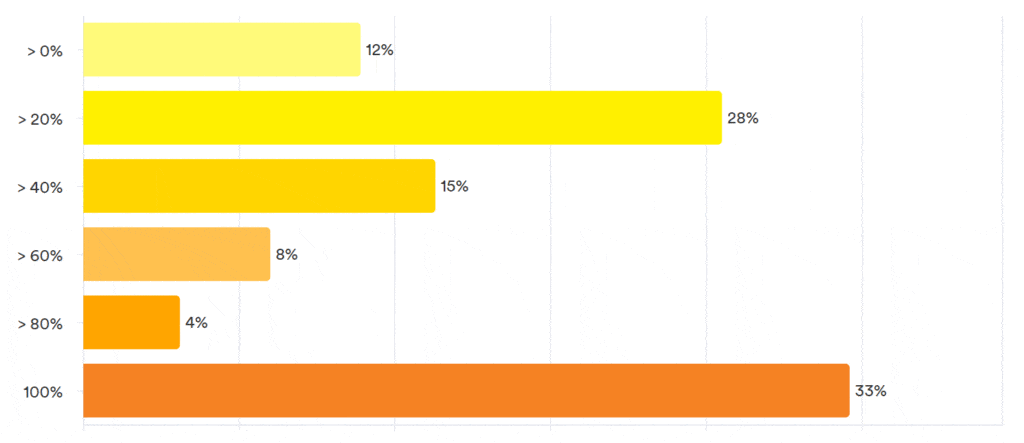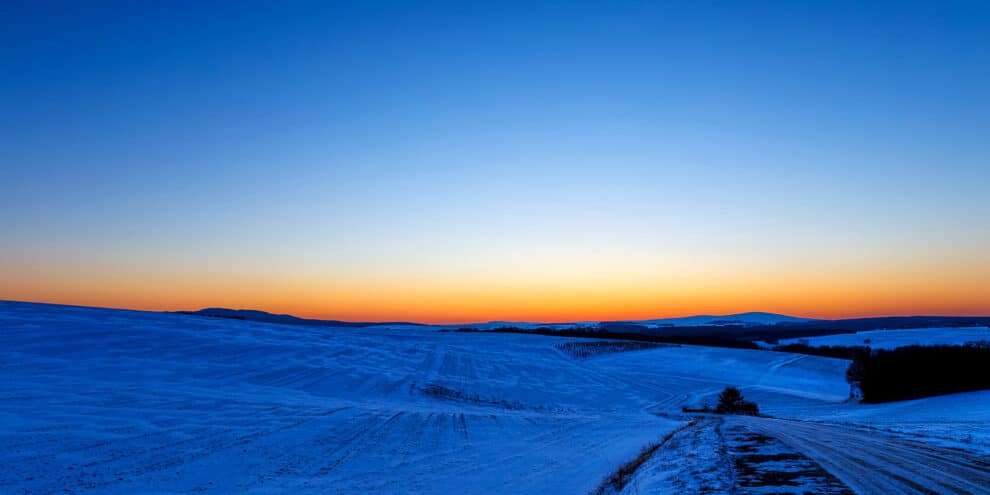According to the February LANDTHINK Pulse results, 33% of respondents indicated that if they were buying land today, they would forgo financing and pay all cash. Coming in a close second, 28% said they would pay more than 20% as a down payment. Even buyers who use financing are electing to make bigger down payments in order to reduce the size of their loan. Rising mortgage rates in 2023 drove the number of loan applications down, but not all potential buyers were put off by rising costs. All-cash purchases are a regular feature of today’s rural and recreational land market.
Last month, the February Pulse asked: If you were buying land today, how much would you pay in cash?

The land market has subtly shifted from being heavily skewed towards sellers, and has been moving towards more balanced conditions. While land price growth has slowed, the lack of land inventory to satisfy buyer demand has kept prices reasonably stable. It remains a competitive market, especially for properties that are priced attractively and possess desirable features.
All-cash purchases are making up a big piece of the land-buying pie for two major reasons: first is affluent Americans who can afford to pay cash are more apt to buy recreational land in an expensive land market, when the income necessary to purchase a property is higher than ever before, and secondly, high mortgage rates make buying land in cash and avoiding interest altogether more attractive. Having dropped steadily from October’s 7.79% high on hopes of Federal Reserve interest rate cuts in the first half of 2024. Last month, rates rose to around 6.52%. So far this month, they’ve been trending a bit lower, and forecasters predict they could drop below 6% by the end of the year.
The uneven economic impact of the pandemic allowed some buyers to save more money, investors to see substantial stock market gains, and homeowners to receive top dollar for their properties. All of these factors contributed to an increase in cash buyers. Buyers who are able to play ball in today’s interesting land market are more likely to be higher earners, and have the incentive and means to contribute large payments. They are leveraging their wealth – whether it is equity or cash.
A cash offer occurs when the buyer has enough liquid assets (meaning cash, or anything that can easily be converted to cash) available to buy land in full. If you have the money to buy rural land in cash, consider the following benefits and downsides.
Benefits of a Cash Offer
- Faster closing. Cash deals typically close faster and involve less hassle for both parties. This quicker timeline is enticing for sellers, because it puts money into a seller’s pocket sooner.
- Negotiating power. Making a cash offer puts the buyer in the driver’s seat. Buyers willing to pay with cash have an inherent advantage over those who need to obtain financing, and sometimes they can win over the seller at a lower price.
- No loan payments. Cash buyers will be able to enjoy their rural land without having to dedicate a portion of their income toward a monthly loan payment. This means more free cashflow every month.
- Save on closing costs and interest. If you buy land with cash, you can avoid many of the costs associated with closing the loan, and you won’t have to pay interest on the loan.
- Less temptation to overspend. When land buyers have to take out a land loan, they often think in terms of monthly payments rather than the total cost. But when you have to hand over a considerable amount of your own money, it makes the cost more tangible.
Downsides of a Cash Offer
- Fewer liquid assets. The downside of buying land with cash can include tying up too much capital in one asset class and sacrificing liquidity; you lock up all that money in the land and can’t easily access it. This could be a problem in the event of an unforeseen financial emergency.
- Opportunity cost. Buying rural land with cash saves you money on interest, but your opportunity cost is all the money you could’ve earned by investing it instead.
- Land ownership delays. For some buyers, waiting until you have all the money you need set aside in cash- and not just for the purchase price- can delay your dream of land ownership. You could put down 25-50% down payment on a land loan and start enjoying your land immediately.
Land is usually bought with cash and a loan, with the buyer paying a hefty down payment and financing the remaining balance. The amount of cash required as a minimum down payment is at the discretion of each individual lender, but land buyers can expect to provide 20-50% down or more on undeveloped land.
If you’re serious about buying land, whether as a cash buyer or through financing, you’re going to have to be decisive and ready to act. Land for sale is going under contract quickly and there’s no guarantee that a property you’re interested in today is going to be available tomorrow.
Do you have a suggestion for next month’s Pulse question? Submit your question and we might choose yours!
This content may not be used or reproduced in any manner whatsoever, in part or in whole, without written permission of LANDTHINK. Use of this content without permission is a violation of federal copyright law. The articles, posts, comments, opinions and information provided by LANDTHINK are for informational and research purposes only and DOES NOT substitute or coincide with the advice of an attorney, accountant, real estate broker or any other licensed real estate professional. LANDTHINK strongly advises visitors and readers to seek their own professional guidance and advice related to buying, investing in or selling real estate.










Add Comment